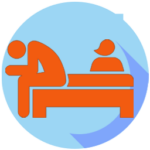Sleep is a fundamental aspect of our lives, essential for physical health, mental well-being, and overall quality of life. However, for many individuals, achieving a restful night’s sleep is not as straightforward as closing their eyes and drifting into slumber. Sleep disorders affect a significant portion of the population, leading to various health complications and a diminished quality of life. In this blog, we will delve into the world of sleep disorders, exploring their causes, types, and available treatment options.
What Are Sleep Disorders?
Sleep disorders encompass a wide range of conditions that disrupt normal sleep patterns, preventing individuals from experiencing restorative sleep. These disorders can affect the duration, quality, and timing of sleep, leading to numerous physical, emotional, and cognitive health issues. Sleep disorders can impact people of all ages and backgrounds, and they can be either chronic or temporary.
Types of Sleep Disorders
- Insomnia: Insomnia is one of the most common sleep disorders. It involves difficulty falling asleep, staying asleep, or waking up too early and not being able to fall back asleep. Chronic insomnia can have a significant impact on a person’s daily life, causing fatigue, irritability, and impaired cognitive function.
- Sleep Apnea: Sleep apnea is characterized by interruptions in breathing during sleep, often due to a blocked or narrowed airway. These pauses in breathing can occur multiple times per hour and lead to poor sleep quality, excessive daytime sleepiness, and serious health issues such as high blood pressure and heart disease.
- Restless Legs Syndrome (RLS): RLS is a neurological disorder that causes an uncontrollable urge to move the legs, especially during periods of rest or inactivity. This constant leg movement can disrupt sleep and result in daytime fatigue.
- Narcolepsy: Narcolepsy is a chronic sleep disorder characterized by excessive daytime sleepiness and sudden, uncontrollable episodes of falling asleep during the day. People with narcolepsy often experience vivid dreams and temporary paralysis when falling asleep or waking up.
- Parasomnias: Parasomnias include a variety of disruptive sleep-related behaviors, such as sleepwalking, night terrors, and sleep talking. These can lead to disturbances in sleep and potentially dangerous situations.
Causes of Sleep Disorders
Sleep disorders can have various underlying causes, including:
- Medical conditions: Chronic pain, asthma, and conditions like Parkinson’s disease can disrupt sleep.
- Lifestyle factors: Poor sleep habits, irregular work schedules, excessive caffeine or alcohol consumption, and high-stress levels can contribute to sleep disorders.
- Mental health issues: Conditions like anxiety, depression, and post-traumatic stress disorder (PTSD) often lead to sleep disturbances.
- Medications: Some medications can interfere with sleep patterns as a side effect.
- Genetics: Some sleep disorders, like narcolepsy, have a genetic component.
Treatment Options for Sleep Disorders
Treatment for sleep disorders depends on the specific type and underlying cause. Here are some common treatment approaches:
- Lifestyle changes: Practicing good sleep hygiene, such as maintaining a consistent sleep schedule, creating a comfortable sleep environment, and reducing caffeine and alcohol intake, can significantly improve sleep quality.
- Behavioral therapy: Cognitive-behavioral therapy for insomnia (CBT-I) is a highly effective approach for managing insomnia by addressing thoughts and behaviors that contribute to sleep problems.
- Medications: In some cases, medication may be prescribed to help manage sleep disorders. For example, stimulants like modafinil are often used to treat narcolepsy, while continuous positive airway pressure (CPAP) machines are commonly used to treat sleep apnea.
- Treatment of underlying conditions: Managing any underlying medical or mental health conditions that contribute to sleep disorders can help improve sleep quality.
- Alternative therapies: Relaxation techniques, meditation, and yoga can be beneficial in reducing stress and promoting better sleep.
Conclusion
Sleep disorders are common and can significantly impact an individual’s physical and mental health. Recognizing the signs and symptoms of sleep disorders and seeking appropriate treatment is crucial for improving sleep quality and overall well-being. If you or someone you know is struggling with a sleep disorder, consult a healthcare professional for a proper diagnosis and personalized treatment plan. Remember, a good night’s sleep is essential for a healthy and productive life.
If you suffer from Narcolepsy, we advise taking Generic Modvigil.












